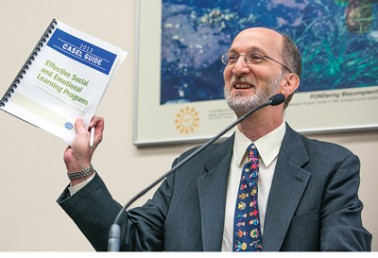Building skills for success

Roger Weissberg, NoVo Foundation endowed chair in social and emotional learning. Photo: Ralph Alswang
A new report identifies educational programs that are effective at building interpersonal skills for success in school, work and life.
The report, co-authored by Roger Weissberg, NoVo Foundation endowed chair in social and emotional learning, highlights 23 school-based programs that promote student competencies such as self-control, relationship-building and problem-solving.
“Social and emotional learning helps students to get along better and reduces conduct problems,” said Weissberg, who is president and CEO of CASEL, the Collaborative for Academic, Social, and Emotional Learning.
“Evidence also shows that students exposed to social and emotional learning improved in motivation and commitment to school,” he said.
“It makes sense. When students learn how to control their impulses and manage their frustrations, they are more likely to stay focused and engaged.”
Weissberg said programs in the guide have demonstrated that with supportive principals, regular professional development for teachers, and holistic rather than gradual implementation, social and emotional learning can improve the school environment and children’s ability to learn academic concepts and skills.
Recent research indicates that addressing social and emotional skills not only improves behavior and reduces bullying, but also fosters academic achievement.
Weissberg co-authored a 2011 review of more than 200 studies, which found that students who received social and emotional learning education improved on standardized achievement tests an average of 11 percentile points compared to students who did not receive such lessons.
The CASEL guide follows a recent report from a National Research Council committee, which was chaired by James Pellegrino, co-director of the UIC Learning Sciences Research Institute, that called for more integration of problem-solving, critical thinking, and communication — known as “21st-century competencies” — within K-12 curriculum.
